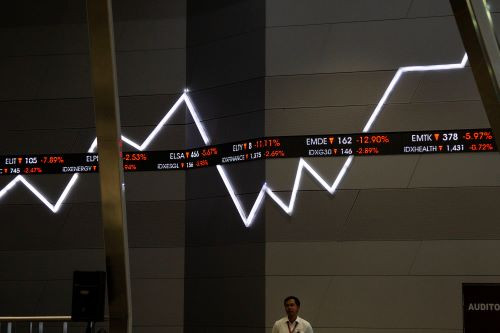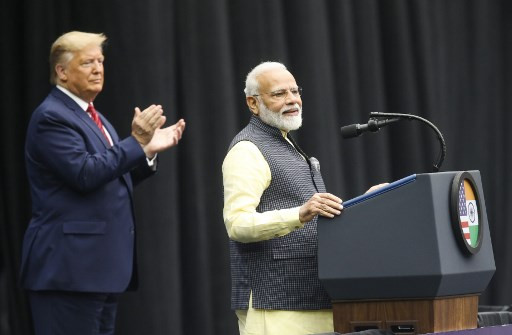Popular Reads
Top Results
Can't find what you're looking for?
View all search resultsPopular Reads
Top Results
Can't find what you're looking for?
View all search resultsIDX Composite closes lower despite earlier gains
Change text size
Gift Premium Articles
to Anyone
 An employee walks past a giant monitor showing the fluctuations of the Composite Index at the Indonesia Stock Exchange (IDX) in Jakarta on Aug. 5, 2024. The IDX Composite closed 0.55 percent lower on Nov. 21, 2024, as sector losses, particularly in consumer goods and financials, outweighed gains. (Antara/Dhemas Reviyanto)
An employee walks past a giant monitor showing the fluctuations of the Composite Index at the Indonesia Stock Exchange (IDX) in Jakarta on Aug. 5, 2024. The IDX Composite closed 0.55 percent lower on Nov. 21, 2024, as sector losses, particularly in consumer goods and financials, outweighed gains. (Antara/Dhemas Reviyanto)
T
he Indonesia Stock Exchange (IDX) Composite index ended in the red on Thursday, posting a 0.55 percent decline to 7,140.91, despite positive movement earlier in the day.
The day’s total transaction value was Rp 9.7 trillion (US$613 million), with 316 stocks declining, 231 strengthening and 244 remaining unchanged.
Over the past week, the IDX Composite index has dropped by 1.02 percent, and year-to-date, it is down by 1.81 percent.
Losses across seven sectors weighed down the broader market. The consumer goods sector recorded the largest percentage decline, falling by 0.92 percent. It was followed by financials, which dropped by 0.80 percent, and property and real estate, which decreased by 0.77 percent.
However, the index was supported by gains in four sectors. Infrastructure led the way with a 0.94 percent increase. Health care rose by 0.41 percent, technology increased by 0.27 percent, and energy added 0.25 percent.
Similar to the broader market, the LQ45 index declined, falling by 0.45 percent to close at 867.74. The top gainers in the LQ45 were PT Indosat (ISAT), which rose by 5.04 percent, PT Telkom Indonesia (TLKM), which increased by 3.36 percent, and PT Dayamitra Telekomunikasi (MTEL), which gained 2.61 percent.
On the downside, PT Barito Pacific (BRPT) saw the largest percentage drop, losing 4.76 percent, followed by PT Aspirasi Hidup Indonesia (ACES), which declined by 3.61 percent, and PT Unilever Indonesia (UNVR), which fell by 3.60 percent.
The market's decline came amid ongoing uncertainty regarding global economic conditions. Investors are still digesting Bank Indonesia’s (BI) recent decision to maintain its benchmark interest rate at 6 percent to stabilize the rupiah and encourage foreign capital inflows.
Analysts noted that the weakening rupiah remained a focal point in market sentiment as the currency faces pressure amid global economic conditions.
BI Governor Perry Warjiyo reaffirmed that the central bank was committed to maintaining a stable exchange rate through market-friendly monetary policies.
"We are strengthening the competitive term repo and foreign exchange swap transaction strategy and strengthening the role of primary dealers to strengthen government securities [SBN] and repurchase agreement [repo] transactions in the secondary market and between market players," he said on Wednesday, as quoted by cnbcindonesia.com.









